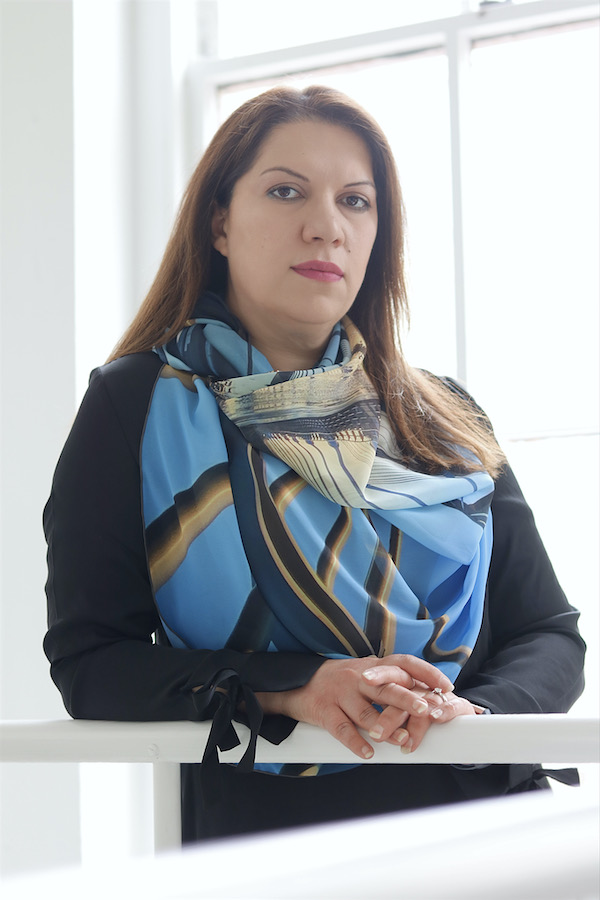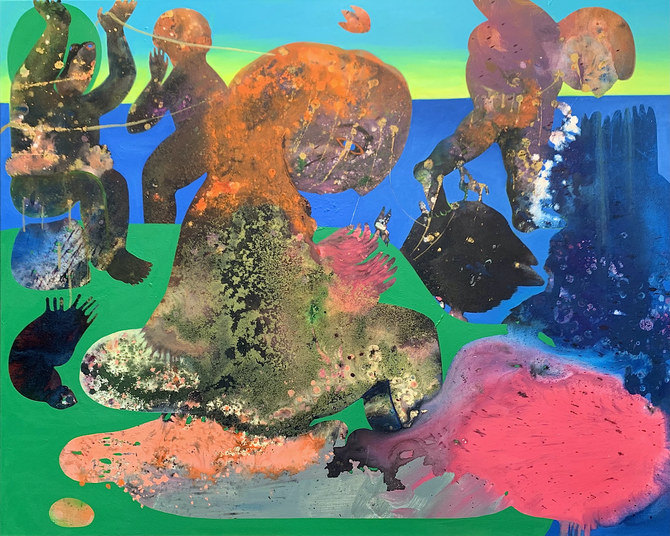DUBAI: March 2023 will mark the 20th anniversary of US-led invasion of Iraq, which led to destruction, displacement, and prolonged political instability. One of the millions who witnessed the chaos unfold is the Iraqi-American painter Vian Sora. “There is nothing that I don’t remember,” she says from her atelier in Louisville, Kentucky.
On the night before the bombing began, Sora, who is of Kurdish origin, drove with her family from Baghdad to the town of Balad Ruz, around 120 kilometers away. “It was so visceral and scary,” she tells Arab News. “We all lived in just one house there — 30 of us slept in one room. We watched the B-52’s bomb Baghdad.”

Vian Sora, Hanging Gardens, 2022. Oil and mixed media on canvas 70 x 55 in (177.8 x 139.7 cm). (Supplied)
Sora was born in Baghdad in 1976, three years before Saddam Hussein came to power in Iraq, changing the course of political affairs in the Middle East. “Really, ever since I was a child, there was war and bombing,” she says.
Amid all the unrest, however, Sora discovered a passion for art. Her mother’s family owned a prominent auction business in Baghdad, where modernists like Faiq Hassan and Shakir Hassan Al-Said gathered, and Sora says she read as much as possible growing up about the Iraqi-British architect Zaha Hadid, in particular. “This was what (was) around,” she recalls. “I grew up in this kind of dreamy world that was parallel to the bombing.”

Sora is of Kurdish origins. (Supplied)
In 2006, Sora left Iraq through the Kurdish/Turkish border, ending up in Istanbul. From there, she moved to the UK, the UAE and finally, the US, where she arrived in 2009. She hasn’t been back to Iraq since leaving, and says it was not an easy transition to life in the country that had invaded her own.
“It was a culture shock. I felt like I always had to dumb down who I am to be accepted, but I also met some amazing people who supported me and my practice,” she says. “They were so hungry to learn more about us. I feel like I don’t just represent Iraq, I represent the whole region.”
The experience of surviving “29 years of war” has definitely seeped into Sora’s expressive canvases, housed in private and public collections in Iraq, the US, France, and Turkey. “Iraq affects everything in my work; it’s my DNA,” she says. “Once you’ve lived through the first three decades of your life in a country like Iraq, witnessing four or five wars, that cannot leave you.”
The self-taught artist tries to leave that which she has endured in the background, like “a dead grandmother who protects you,” she says. Her work is inspired by both her own life and by global issues such as climate change and cultural destruction. She quotes what the German artist Anselm Kiefer once said about the role of an artist: To observe and do the work.
She describes her large paintings, inspired by Middle Eastern history and aesthetics, as a form of ‘gestural abstraction.’ They are full of rich colors, floating shapes, dreamlike landscapes, and curious figures. There are portrayals of chaos, explosions, life and death — and of the moment after death, reaching the sublime. Decay, and seeing the beauty in it, is Sora’s obsession.
“It’s an equivalent of my own life,” she says. “I feel like, the older we get, the more refined we’re supposed to be. I feel the decay that has happened within me is equivalent to the physical decay I see in artworks and palaces. We persevere through certain things, or we fail. We might be destroyed in the process, and that’s what interests me.”
The physical act of painting is a way of staying whole. “I come to the studio super-early in the morning, shut the world off and put on my music. I’m immersed in that moment. It’s the best feeling,” she says. It is also a way of dealing with her post-traumatic stress disorder, caused by escaping near-death experiences.
“The only way to get it out of me somehow, or to work with this, is to continuously repeat that feeling,” she explains. “In the end, I don’t want the work to be about death or terribleness. It will be, somehow, but I also want to create elements of beauty.”












